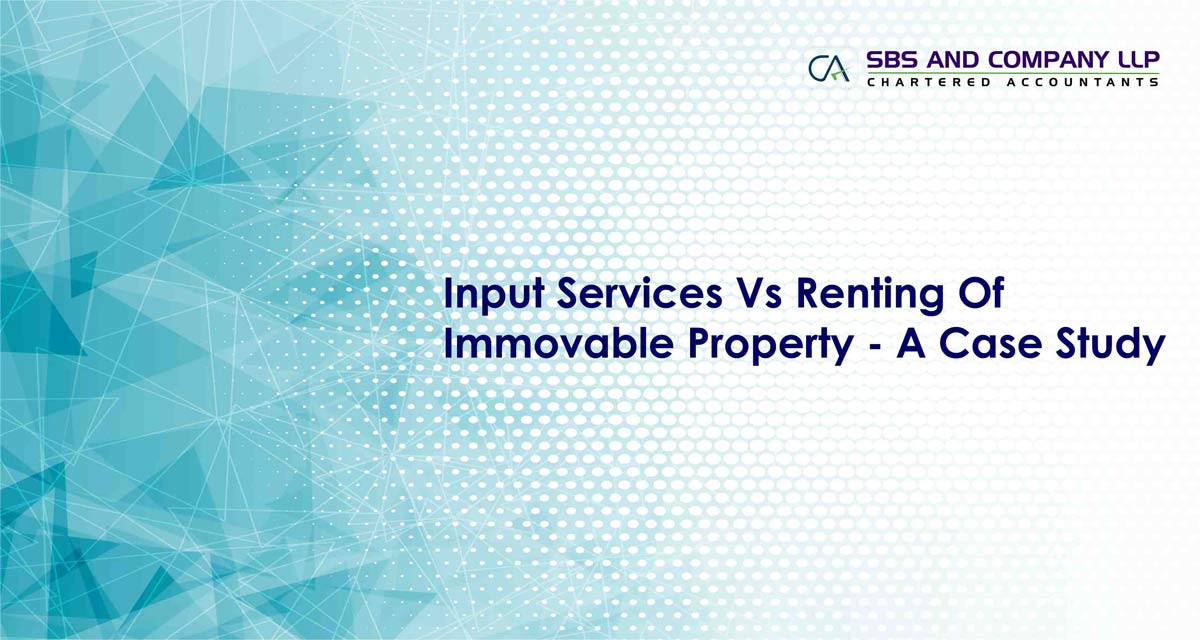The definition of ‘input service’ is always a mystery to the trade and business and has created a huge litigation as regards to what is eligible as input service for utilization of the same. The Board has amended the definition of the ‘input service’ with effective from 01.04.11 in anticipation of putting an end to huge litigation. The restricted amended definition has put an end to majority of the issues, however still leaving certain issues unaddressed. This article aims at dealing an issue ‘whether the credit of service tax paid on renting of immovable property services is eligible for cenvat credit to utilize the same against the excise duty/service tax as far as the manufacturer/service provider is concerned.
Before examining the issue, it is very important for the reader to note the changes that have taken place in the definition of ‘input service’ as laid down vide Rule 2(l) of Cenvat Credit Rules, 2004. Earlier to 2011, the definition of ‘input service’ is very wide enough to cover all the services in its ambit to claim as Cenvat Credit for the service provider. This definition has led to a huge revenue loss to the exchequer and hence there was an amendment to the definition of ‘input service’ post 2011 which has restricted the scope of such definition, which shall be discussed in detail in the later part of the article.
The amended definition which was effective from 01.04.2011 has made the definition of ‘input service’ into 3 parts.
1st Part – 100% nexus with the provision of the output services provided by service provider;
2nd Part – Irrespective of the Nexus theory, the credit stand eligible;
3rd Part – Specifically Excluded from the ambit of the definition.
As laid above, the first part of the definition deals with eligibility of the credit of services, which are having nexus with the provision of output services. Hence, all services which are having intimate nexus shall be eligible vide this part of the definition except specifically excluded (vide third part of the definition). The second limb of the definition of the said input service deals with eligibility of the credit of services irrespective whether they having nexus with the provision of output services. To be more lucid, once the services procured falls in the second limb, they are eligible for availment of credit irrespective of having nexus with the output services.
Let us take the current issue for examining the eligibility of the cenvat credit of service tax paid. Let us understand by taking an example. Consider a company engaged in provision of services pertaining to leasing of vacant land with infrastructural supports to manufacturers. The manufacturer enters a lease agreement with such company for availing the leasing services and infrastructural support. The said company charges service tax and the manufacturer pays the same and avails the said service tax paid as cenvat credit.
Now the revenue is of the opinion that such service tax is not eligible since the same does not have nexus with the output service provided or manufacturing of the finished goods as far as the service tax on the lease hold land is concerned. Further, they were of opinion that service tax paid on the infrastructural services1 is not eligible since said services are used outside the premises of the manufacturer/service provider. In this context let us examine whether the contention laid out by the department stands to the test of the judicial scrutiny.
For the manufacturer, the definition of ‘input service’ vide 1st limb allows services used by manufacturer whether directly or indirectly in or in relation to manufacture of the final products. Without the land, a factory cannot be established and without the factory, there cannot be any manufacturing activity and hence it is very absurd and illogical to state that the immovable property is not having nexus with the manufacture of final product.
Further, for the service provider, as laid down above, the 1st limb of the definition allows credit on services which are having intimate nexus with the provision of output service unless specifically excluded by 3rd limb. It is very illogical or completely absurd that to state that without a leased land there would be provision of output services. There cannot be a provision of output service without an premises of the service provider, it is highly unimaginable and hence the service tax paid on the lease hold land is very eligible since the said input service is also not specified in the 3rd limb of the definition of ‘input service’.
It is very important to note that the provision of infrastructure services plays a crucial role for the manufacturer/service provider to avail the land on the lease. In absence of the proper infrastructural services, the land shall not be useful because no prudent business man would avail the land for construction of factory. Hence, the said infrastructural services are also having nexus with the manufacture of final products and hence eligible for availment of cenvat credit.
So, in my view, the credit of service tax paid on lease land hold and infrastructure services are eligible for availment as cenvat credit both for manufacturer and service provider for utilization
- Infrastructural support would mean development of roads, water supply network and reservoirs, sewer networks and sewerage treatment plant and other various allied support services.
against the output payable. The contentions raised by the revenue would not stand before the judicial scrutiny at the higher levels. When the 99 year lease hold land is considered as service and service tax is being collected, the same shall be eligible for credit in absence of any specific restrictions in the definition of ‘input service’.
This article is contributed by Partners of SBS and Company LLP – Chartered Accountant Company You can be reached at This email address is being protected from spambots. You need JavaScript enabled to view it.



